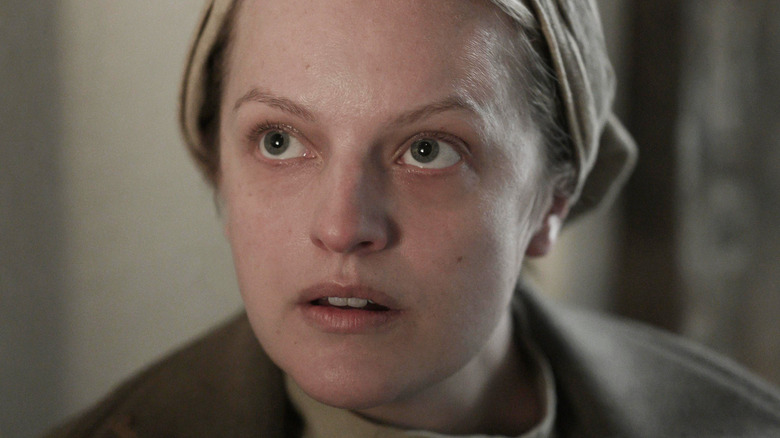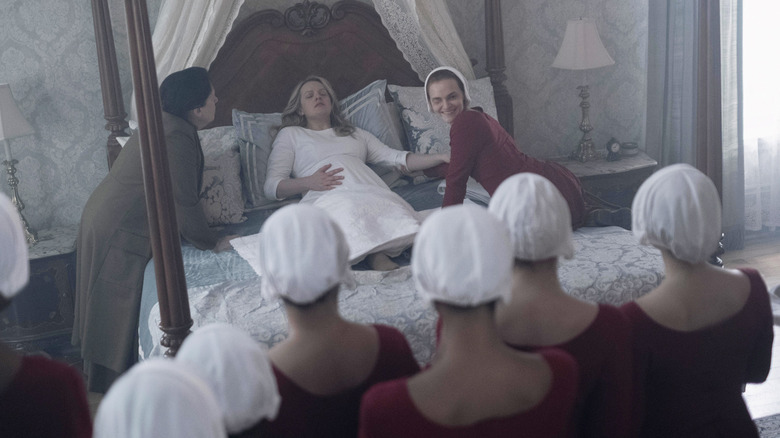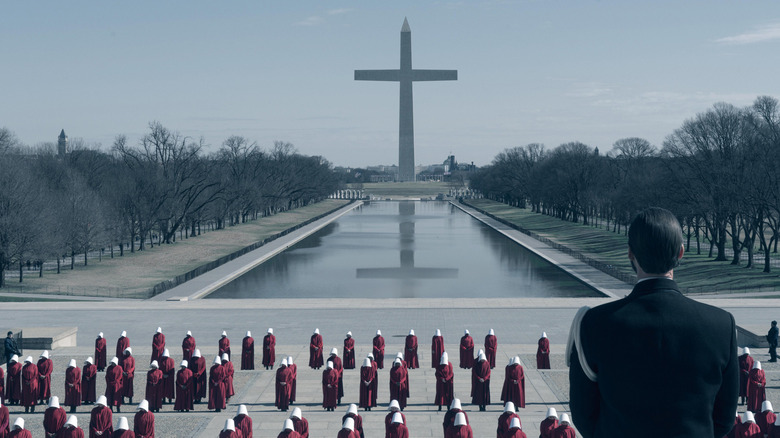What Religion Do They Practice In Gilead On The Handmaid's Tale?
Season 5 of "The Handmaid's Tale" premieres on Wednesday, September 14. When it does, it will take viewers back to the world of Gilead. In both the TV series and the novel by Margaret Atwood that it's based on, Gilead is a dystopic version of America. In a world wracked by a population decline, fundamentalist Christians have taken power and imposed a brutal forced fertilization program on the country's few remaining fertile women.
Gilead is very obviously a Christian theocracy, but it's not just a generically Christian nation. It's much more specific than that. In the afterword to her novel, Atwood explains that Gilead's authorities persecute and kill other Christians who refused to convert to Gilead's state religion, like Catholics, Baptists, and Quakers (via Psychology Today).
Gilead's state religion is an unusual branch Christianity, but that doesn't mean Atwood made it up, either. Atwood has said that there's "nothing in the book that didn't happen, somewhere" (via Lithub). In fact, Gilead's state religion goes all the way back to the beginning of America.
Gilead practices a resurgent form of Puritan fundamentalism
Margaret Atwood has explained the origins and inspirations of her novel "The Handmaids Tale" many times before. In a 2017 "New York Times" essay Atwood wrote that "The Republic of Gilead is built on a foundation of the 17th-century Puritan roots that have always lain beneath the modern-day America we thought we knew." In college, Atwood studied under Harvard professor Perry Miller, who pioneered the study of Puritanism. When "The Handmaid's Tale" was published in 1985, she dedicated it to him (via History News Network).
The Puritans were one of the religious groups that arose in England in the late 16th century, and mostly migrated to North America between 1630 and 1640. Their goal was to reform the Church of England, which they felt was too influenced by Roman Catholicism and its rituals, especially those not found in the Bible. As an antidote, the Puritans relied almost entirely on the Bible as their guiding document (via Britannica).
As a result, much of Gilead's society is directly modeled after the Bible. "Gilead" is named after the ancient region of Palestine found to the east of the Jordan River (via Britannica). The entire Handmaid program is based on the Biblical story of Rachel and her handmaid Bilhah. In the Book of Genesis, Rachel thinks she's unable to have children herself. As a solution, Rachel orders her handmaid Bilhah to have children with Rachel's husband Jacob, so that Rachel can raise them herself. Like many aspects of Gilead, the Handmaid program is a twisted interpretation of a Bible story. Even the building where the Handmaids live is called "The Rachel and Leah" center, named after Rachel and her sister (via The Handmaid's Tale Wiki).
Except this form of Puritanism is much more about power than religion
It would be a mistake to assume that Gilead society is simply based on a literal translation of what's in the Bible. In fact, many aspects of Gilead have been subtly reinterpreted or reimagined, all to suit Gilead's leadership.
There are many examples in both the TV show and the book. In Season 1 of "The Handmaid's Tale," when Aunt Lydia (Ann Dowd) orders Janine's (Madeline Brewer) eye to be removed as a punishment, she tells Janine "Blessed are the meek," conveniently leaving out the second part about how the meek will inherit the Earth.
In the book, the Handmaids are forced to listen to a tape recording of a man who's supposedly reciting from the Beatitudes. "Blessed are the silent," he says. "From each according to her ability; to each according to his needs." It's presented as Biblical scripture, but it's actually a paraphrased line from the works of Karl Marx (via Psychology Today).
Then there's the Jezebels, an entire program to force women to become sex workers to serve Gilead's Commanders–who run a society where adultery is normally punishable by execution. In case it wasn't abundantly clear, the rulers of Gilead don't practice what they preach. For them, neo-Puritanism is a means to control people, especially those who can give birth.


